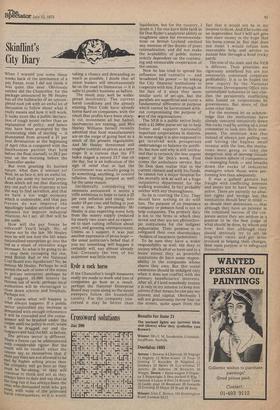Skinflint's City Diary
When I warned you some three weeks back of the imminence of a pay freeze, even I did not think it was quite this near. Obviously neither did the Chancellor, for the package announced by Mr Healey has all the hallmarks of an uncompleted rush job with an awful lot of discussion to follow about what it really means and how it will work. It looks more like a public declaration of tough intent rather than an explanation of policy, and hence May have been prompted by the accelerating slide of sterling — it Plummeted from around a 21 per cent devaluation at the beginning of April (this is compared with the Smithsonian parities that held before the float started), to 29.2 per cent on the morning before the Chancellor spoke.
But even granting its hurried nature, what does it amount to? Well, let us face it, not an awful lot. shall put aside my natural prejudices which tell me that distorting any one part of the economy is not the way to find salvation, and that We have a low wage economy Which is undesirable, and that pay freezes do not improve the appallingly luddite attitudes of our unionists nor improve industrial relations. As 1 say, all that will be put aside.
How will the pay, freeze be enforced? You'll laugh. No, of course not by the law. Mr Healey says he will not foot the bill when nationalised enterprises go into the red as a result of excessive wage increases. So what is he going to do — stop them recouping the rise, send British Rail or the National Coal Board into liquidation? No, be serious Mr Healey. Perhaps he will Permit the sale of some of the mines to private enterprise; perhaps he Will suggest 10,000 miners be thrown out of work; perhaps local authorities will be encouraged to Close down schools and hospitals. Perhaps not.
Of course what will happen is What always happens. If a public sector unjustified pay increase is demanded with enough vehemence It will be conceded and the consequence will be brushed under the Farpet until the policy is over, when it will be dragged out and the taxpayer will foot the bill, as before. The private sector is different. There a freeze can be administered With considerable rigour. But the , result will be twofold: either the unions say to themselves that if their pay rises are not allowed to be ntet by higher selling prices then the company will go bust so they Must be far-seeing; or they will continue to think and act as they always have to date and say that in the long run it has always been the ones who demanded most who got most, with none of the promised harsh consequences, so it is worth taking a chance and demanding as much as possible. I doubt that all union leaders will simultaneously be on the road to Damascus — it is safer to predict business as before.
The result may well be widespread insolvency. The current harsh conditions and the already existing Price Code have already borne hard on companies, with the result that profits have been sharply cut, investment all but halted, insolvencies are soaring, and Mrs Shirley Williams herself recently admitted that food manufacturers are on the verge of going bust as a result of the present regulations. And Mr Healey threatened still tougher controls on prices at a later stage. It is curious that the FT Index staged a record 23.7 rise on the day, but is an indication of the sigh of relief that at last the Government was actually going to do something, anything, to control inflation. Sterling jumped as well for the same reason.
Incidentally, considering the measures announced, it seems a trifle ambitious to hope to turn a 25 per cent inflation and rising, into under 10 per cent and falling in just over a year. So presumably Mr Healey is also expecting some help from the money supply (reduced for nearly two years and so expected to start cutting inflation about now), and growing unemployment. Unless, as I suspect, it was just another expression of pious hope — the usual politician's belief that if you say something will happen it certainly will, nay almost already has. Certainly the rest of his statement was little more.


































 Previous page
Previous page